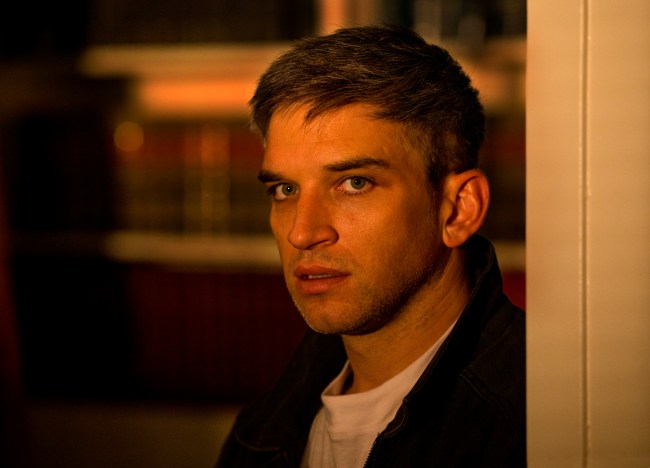In September 2023, several months after both the actors’ and
writers’ strikes
At Venice Beach’s Electric Lodge, a multifaceted arts and community hub offering activities ranging from taekwondo lessons to live shows, an event began to take form. Over several weeks, this space became host not only to its usual array of events but also to something quite uncommon these days—a fresh theatrical piece penned by playwright David Mamet.
Throughout the years, this contentious Pulitzer Prize-winning dramatist has faced criticism due to his political views and the nature of his creations, whether performed live or screened. Some perceive “Henry Johnson” as an answer to these criticisms—it essentially tells a tale about the pitfalls of conforming blindly and navigating life devoid of ethical guidance—while others view it as an eternal fable with similar themes. Spanning four acts, the movie (as well as the theatrical production) traces Henry’s journey under Jonigkeit’s portrayal; his existence takes a dramatic turn following involvement in a horrific act, incarceration for his actions, and grappling with finding purpose amidst chaos.
Regardless of the takeaway, the performance was successful, and in the subsequent weeks following its limited engagement, Mamet along with his four lead actors (Evan Jonigkeit portraying Henry Johnson, alongside Shia LaBeouf, Chris Bauer, and Dominic Hoffman) gained recognition.
decided to pursue a film adaptation
, putting Mamet
returning to the director’s seat for the first time in more than ten years
The outcome is a thrilling movie as well as a strong case for not being overly meticulous when transitioning a project from script to screen.
This film represents the inaugural collaboration between Mamet and Jonigkeit, who not only star as Henry Johnson but also served as producers. They have adopted a fully grassroots approach to distributing the movie. Notably, Jonigkeit is related to Mamet through marriage; he wed actress Zosia Mamet back in 2016. However, despite these personal ties, Jonigkeit acknowledges their differing viewpoints: they often clash over acting techniques—Mamet prefers methods far removed from what Jonigkeit considers crucial preparatory steps. Yet surprisingly, this creative friction does not mar the final product; some might argue it enhances the result instead.
In front of him, Jonigkeit shares with Efwebe about the initial inspirations behind the story. He explains how the film serves more as a “documentation” of the play rather than being a traditional adaptation. They discuss strategies for tackling 30 pages of dialogue and explore his aspirations for the movie’s future trajectory. Additionally, they touch upon potential paths towards independent distribution for other projects he may be involved in down the line, culminating in insights into his final scene on camera.
This interview has been streamlined and shortened for clarity and brevity.
Efwebe: It sounds like the idea to do a filmed version of the play happened early on in the life of the play. What sparked that idea?
Evan Jonigkeit:
The production began amid the writers’ strike. A few years prior, while filming a television series, Dave shared the script with me asking, “What do you make of this?” I responded, saying, “It’s quite impressive.” Although I received it initially, everyone only found time due to the strike. The project eventually unfolded in LA; however, we had no clear strategy moving forward. Once it gained traction and attention in Los Angeles, we thought, “Wow, this could be really interesting. How should we proceed from here?”
Myself, Dave, and Shia all went out to lunch once we were nearing the end of our run, and we started kicking around ideas. It seemed unlikely that we would be able to do it [as a play] in New York. But I had produced quite a bit of other things prior to this, and so I just suggested, as a record of the theatrical piece, “I think we can make a film.” And, yeah, it’ll be an extraordinary amount of work on everybody’s part, but I think the filming of it will be relatively easy so long as we, the actors, stay sharp.
In the months between when we finished doing the play and when we shot the film, myself and the other actors, we stayed in touch, and we would hop on a Zoom, and we would run lines, and we would continue to work on it. The biggest variable was being able to modify our performances from the stage to be able to be a film performance.
What was the duration of time between your previous live show and filming the movie?
I believe we wrapped things up around September or early October [2023], followed by filming in January [2024]. It all came together quite quickly after that. Shia recommended bringing aboard Lije Sarki as an additional producer, which Lije and I embraced wholeheartedly. Additionally, I enlisted Erin Kennedy—a seasoned co-producer whom I have collaborated with frequently—and she has been instrumental due to both her skills and dedication. Together, we assembled our team, identified suitable shooting sites, secured funding, and ultimately managed to get everything off the ground smoothly.
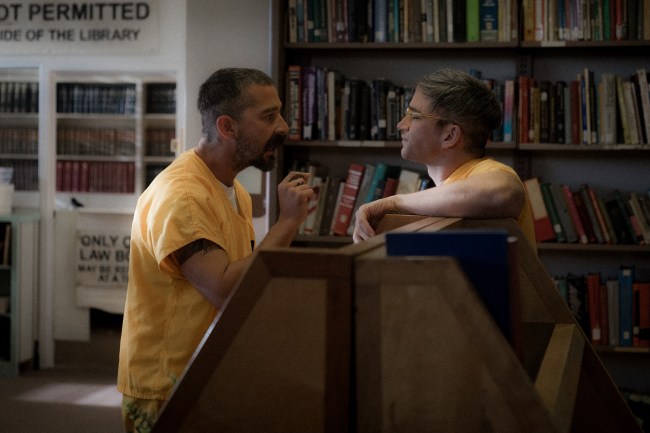
It’s intriguing how you refer to this as a “record” rather than labeling it an “adaptation.” Could you clarify where you draw the distinction between these two terms?
During our discussion on how to proceed, it essentially boiled down to this: the quality of the script is set, and whether the performances will be strong enough to salvage it remains to be seen. Additionally, there’s a method to enhance the visual aspects cinematically, and I believe Sing Howe Yam, our director of photography, successfully combined these elements quite well.
However, when considering whether we should include extra scenes as connecting elements to assist viewers in bridging potential gaps—making it align more with typical contemporary filmmaking—the decision was clear: No. The strength of this work lies in staying ahead of the viewer, keeping them continuously attempting to keep pace with the narrative.
As a recording, you weren’t planning to proceed without the original cast, correct?
Absolutely. Our capability to film that initial scene, spanning 30 pages, within a single day depends entirely on our readiness to dive right back into it. Once I step out of my role as producer and pass the responsibilities over to Lije, I can focus solely on being present in the room with Sing and Dave who handle all the preparatory work beforehand. This ensures that everyone knows how to maintain efficiency and navigate through that busy day productively.
However, indeed, it depended on the actors’ ability to adapt their performances for the screen while maintaining the same speed and naturalness they had developed during the months of performing at the Electric Lodge in Venice.
What was the effect of deciding against including any “extraneous scenes” on how you prepared for your role? A great deal occurs “behind the scenes” that significantly influences what befalls Henry.
These fundamental acting principles involve understanding my given circumstances, determining why I’m entering this space, and identifying what I desire from the individual opposite me. This preparatory work is essential, butDave might argue, “You don’t really need to go through all that. Just focus on hitting your marks and reciting your lines.”
However, as an actor, this approach isn’t suitable for me. I require building the connecting elements to ensure each response and anticipation towards unseen characters has clarity. For authenticity, I must develop an inner world that feels instinctual enough not to demand conscious thought.
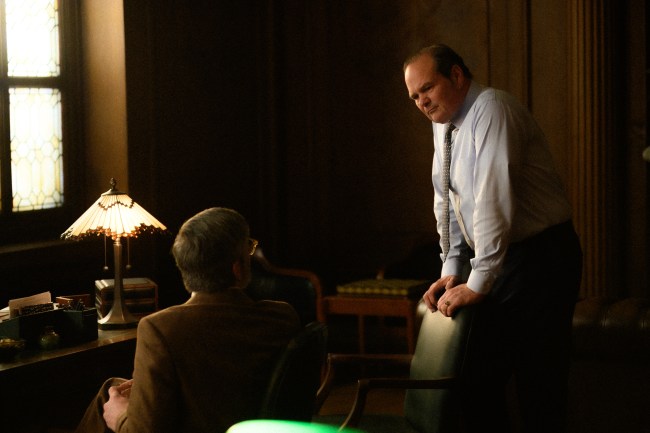
Like you said, Dave doesn’t think actors should focus on internal processes to develop characters, whereas your method takes a distinct path. Could you share how this difference is discussed when working together on set?
There’s no real necessity for uniformity here. Everyone prepares differently, and Dave composes with such brilliance that it opens up countless rich avenues. This diversity is part of what makes performing this multiple nights in theatre truly special—every show brings something new because everything feels vibrant and ever-changing each evening.
When it comes to our collaboration, Dave will make sure I’m aware if he’s securing something or not. The key idea is that if everyone hits their marks, delivers their lines authentically, everything should fall into place. Each actor has their own distinct approach to achieving this authenticity—my method differs from Shia’s, Chris’, or Dom’s methods; each one of us follows a uniquely tailored process akin to having individual fingerprints.
I think every actor has their own whatever “process,” but we had the benefit of months of being on stage and finding all of these different avenues and the truth revealing itself night in and night out based on what the other person’s doing. It’s not traditional to most of the film projects I’ve done because, we had so much time beforehand working on the material that we had a real freedom and trust in each other to let that dance be as alive as possible.
With the film, you’re missing the element of the live audience, though you’re still performing to whoever is on set that day. What does that change about how you feel in the moment of performance?
The reason I started producing was because the first time I was on a film set, I was very lucky. I did a couple of indies, and I didn’t know anything that was going on. And then I did “X-Men,” and I didn’t know
anything
that was going on. There’s hundreds and hundreds of people around me, and I was so nervous because I was always feeling like I was in the way. I just was like, “What is it exactly
you
do, and what is it exactly
you
do, and what is it exactly
you
do?” Trying to learn what everybody did so that I wasn’t impeding their work, it allowed me to then focus on my work. I was like, “Oh, you just need this person, this person, and this person, and you can go off and make the thing.”
That’s when I began [producing]. Once everyone gets used to their respective positions, which for me means relying on them as a feedback source, you truly grasp what works within the project. Adjusting the performance involves leaving things in the hands of fate—or whatever higher power one believes in—and trusting both your authenticity and the editor’s ability to convey the narrative effectively. Dave plays an essential role here, steering this process firmly.
I can’t focus too heavily on the audience; my main concern should be Henry. I need to concentrate on what Henry is experiencing and learning, staying present in the moment so that the audience can share Henry’s journey alongside him.
I read that Dave said that he wrote this role for you. Is that true?
[Laughs]
He saw me in a play in Los Angeles called “Witch” [in 2019] by Jen Silverman, which was a really, really cool show. Dave had never even seen my work before that, he generally watches old movies and is a cinephile. He’s watched every Japanese film, and he’s watched every film noir, and he’s watched everything pre-1975, he’s watched everything. So it was not a surprise to me that he hadn’t seen my work, but then he saw me in this play, and he then sent me a letter with this script and said, “Evan, I’d like you to play the title role of Henry.” And that was that.
But he wrote it because he had heard a story, that horrific act that you hear about in the first scene was something that he encountered [in real life]. He met somebody that was essentially in those circumstances that Henry is in, and he was fascinated by the fact that somebody would do that, would go and help a person who had done something so horrible when it seems so counterintuitive to what his own notions of justice and morality are. So did he write it for me? He wrote it and wanted me to play Henry is what I know.
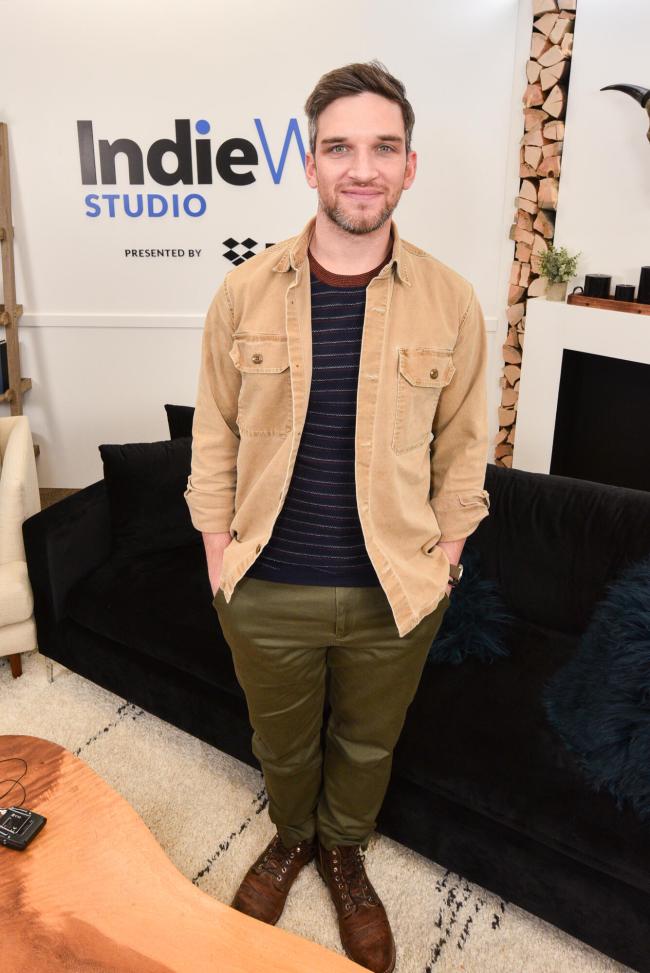
You and Dave have a variety of relationships with each other, both personal and professional. How do you navigate that on set when it’s like,
he’s my director, he’s my friend, he’s my father-in-law
?
It felt quite organic. We hadn’t crossed paths professionally before, yet I was well aware of his remarkable talent. Initially, it seemed odd—this person who became both a close friend and my father-in-law, someone I’d share meals with during visits to Los Angeles—now transitioning into a collaborator, demanding much from our interaction. Neither of us understood the other’s work style, but fortunately, we spent valuable time together in the theater as he actively participated in refining the screenplay. This allowed for open and honest discussions between us.
Navigating wasn’t particularly tough. Ironically, we’re now more connected than we’ve ever been before. Previously, our interaction was quite conventional—you’d visit your in-laws, eat together, and call it a day—but nowadays, it’s more like casual banter such as “What’s new buddy? How ya doin’?” We often chat casually for around thirty minutes. This has transformed into a significant connection despite differing viewpoints; however, mutual care and respect ensure these discussions remain enriching and thought-provoking perhaps because of this evolution.
I believe that when viewers watch the movie, they will attempt to identify elements and remark, “Is this a very
timely
The narrative revolves around
this
To me, however, it feels eternal; it’s a narrative about conformity and an individual being coerced and bullied into submission without maintaining their own thoughts. What’s your take on it?
At minimum, I find this movie stimulating to one’s thoughts. Several aspects stand out to me, particularly after spending such an extensive time working on the screenplay. For instance, during the opening scene, when Henry asks, “What about compassion?” We all tend to think our actions are driven by compassion—myself included—and I believe this sentiment is quite common across different perspectives. Regardless of where someone stands on various issues, most folks assume they’re acting from a place of empathy and consider these acts as beneficial for themselves, their family, or broader causes. However, individuals often fail to examine the unforeseen repercussions stemming from well-intentioned efforts at compassion. It would be valuable if more people questioned whether their empathetic impulses align with ethical standards.
To me, or rather through Henry’s perspective, this highlights the broader issue: whether he is merely deceived or just someone used as a pawn. But what really strikes me is the larger query—am I correct in my empathy? Should I be examining my own compassion whenever it clashes with the concept of justice? As for myself, Evan, I genuinely believe in our judicial system. Sure, it has flaws, yet without such a framework, we would essentially live in an uncivilized world.
That is one of the core questions of Henry and something that I was fascinated by, this fatal flaw that he had was something I had an inkling about the first time I read it. I was like, “Oh, no, oh, no, don’t do that, Henry. Oh, no, oh, no. I understand why you would, but just don’t.” I think we see that a lot in the world, and I think there’s a lot of people that can relate to that, that do something that they believe is the right thing to do, and then the trickle-down effects of that are much more dastardly than they could have ever anticipated.
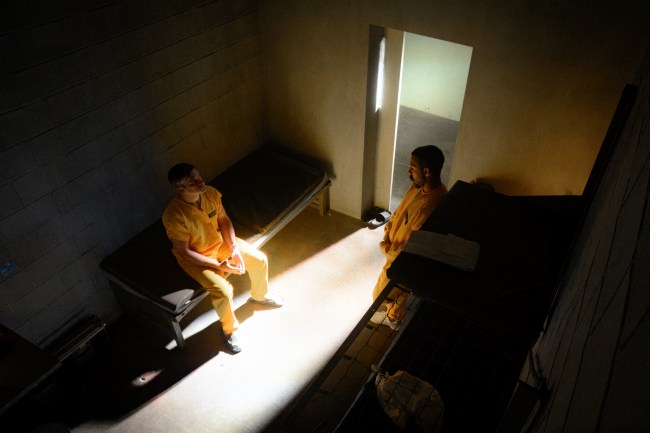
In the final scene of the movie, we witness Henry being incredibly enthusiastic about the prospect that he might have made the correct choice, a recognition long overdue but finally within reach after facing challenges all along his journey. In this instant as Henry, your face truly radiates with joy and satisfaction.
Dom does such a beautiful job of being a trustworthy person, and ultimately, he gives Henry what he wants. He has given him this moment of respite, where somebody has finally seen that there’s goodness in him, and that this was all just a big misunderstanding.
The approach to distributing the movie is rather intriguing: it will play in select cinemas, yet simultaneously be accessible for instant rental online via Slingshot LLC. Could you share your thoughts on why this decision was made and what impact you anticipate it may have on others?
These days, with studios being unwelcoming and film festivals becoming less lucrative for sales, we opted early on to produce this project entirely independent of the studio system and distribute it similarly. The moment we conceived having henryjohnsonmovie.com as our primary platform for reaching audiences, excitement surged through us since it allows direct access to viewers bypassing numerous intermediaries. This approach aligns perfectly with the nature of the movie; it’s crafted autonomously, making it inherently non-traditional yet retaining its identity as a work directed by David Mamet featuring Shia LaBeouf.
However, we continue to host these specially organized theatrical screenings. Tonight, I’ll be at the Texas Theatre in Dallas. Last week, I was at the Bryn Mawr Film Institute, and I will be participating in additional events where I engage in similar discussions with audiences. If you’re unable to catch it in cinemas, though, you can visit henryjohnsonmovie.com to rent it. This allows us to potentially return profits to our investors faster and empowers independent filmmakers.
This scenario serves as an additional test case. Should it prove successful, it could serve as a significant jolt to numerous distributors and sales firms who might say, “We won’t offer minimum guarantees moving forward since our current approach isn’t working.” Despite this shift, I firmly believe that having a strong theatrical release remains crucial both for the movie itself and for viewers. The theater experience holds great importance for me, yet we acknowledge that making independent films thrive within today’s challenging landscape poses considerable difficulties.
We could have lingered indefinitely, waiting for film festivals, which typically come with their own set of priorities that might impede the progress of this kind of movie. But since establishing a connection with Slingshot, we’ve been able to bypass those hurdles and aim directly at reaching the broadest audience possible. This way, more viewers can visit our site and ideally, we’ll maximize exposure to as many eyes as feasible.
Henry Johnson will become available for rent beginning Friday, May 9.
straight from its official website
, featuring nationwide theater releases starting on the same day at the Aero Theatre in Los Angeles
.
More from Efwebe
- Did the Success of ‘The Substance’ and ‘Anatomy of a Fall’ at Last Convince Cannes?
- Cannes (At Last) Includes Bi Gan’s ‘Resurrection’ and Additional Films in Official Selection
